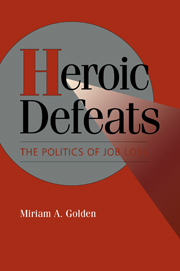Book contents
- Frontmatter
- Contents
- Preface
- List of Abbreviations
- Chapter 1 The Puzzle of Union Responses to Workforce Reductions
- Chapter 2 Games Analyzing Job Loss
- Chapter 3 Job Loss in the Italian and British Automobile Industries
- Chapter 4 Triggers of Industrial Action
- Chapter 5 Pit Closures in the Japanese and British Mining Industries
- Chapter 6 Seeking Allies: How Other Actors Affect Interactions over Job Loss
- Chapter 7 Conclusions
- Notes
- References
- Index
Chapter 6 - Seeking Allies: How Other Actors Affect Interactions over Job Loss
Published online by Cambridge University Press: 20 January 2010
- Frontmatter
- Contents
- Preface
- List of Abbreviations
- Chapter 1 The Puzzle of Union Responses to Workforce Reductions
- Chapter 2 Games Analyzing Job Loss
- Chapter 3 Job Loss in the Italian and British Automobile Industries
- Chapter 4 Triggers of Industrial Action
- Chapter 5 Pit Closures in the Japanese and British Mining Industries
- Chapter 6 Seeking Allies: How Other Actors Affect Interactions over Job Loss
- Chapter 7 Conclusions
- Notes
- References
- Index
Summary
During the 1950s the coal industry faced dramatic and global changes in the competitive position of its product. As the decade progressed, industrial economies increasingly turned to oil rather than coal as a major source of fuel. In Japan miners at the Miike mines battled pit closures in the 1950s with greater aggressiveness than miners anywhere else in the world (McCormick 1979: 172). But after winning an apparently historic victory in the middle of the decade, at the end of the 1950s they went down to defeat after an even longer strike. In Britain, by contrast, widespread pit closures after 1957 proceeded virtually uncontested. Even as redundancies in the industry increased in the latter part of the 1960s, the National Union of Mineworkers accommodated the contraction of the British coal industry. Only in the mid-1980s did the NUM battle closures, in a dramatic and protracted dispute that the union eventually lost.
This chapter analyzes these three disputes in detail. Using the gametheoretic models developed in Chapter 2, I argue that all three strikes were aimed at organizational survival. In each case, the union involved believed that the future of its organization was at stake. The precise dynamics underlying the three conflicts were somewhat different, however.
In the case of the 1953 strike at Miike, organizational survival for the local union was largely a matter of defending activists. Like the Fiat strike in 1980 and the BL dispute in 1956, the 1953 Miike dispute was provoked when management inadvertently targeted too many shopfloor union representatives for the union to tolerate.
- Type
- Chapter
- Information
- Heroic DefeatsThe Politics of Job Loss, pp. 116 - 134Publisher: Cambridge University PressPrint publication year: 1996

